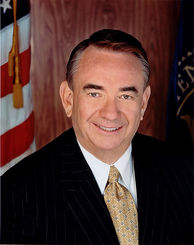Wisconsin’s Other Big Ticket Summer Election: The Republican US Senate Primary
Republicans have won 15 of 28 general election U.S. Senate contests after holding a contested primary and just 1 of 8 when uncontested
 It seems all political crossroads lead to Wisconsin in 2012.
It seems all political crossroads lead to Wisconsin in 2012.
Two weeks ago, Mitt Romney delivered what ended up being the knock-out blow to Rick Santorum in the GOP Badger State presidential primary.
In less than two months, a rare gubernatorial recall election will be held for Governor Scott Walker, along with Lieutenant Governor Rebecca Kleefisch and four GOP state senators.
The recall vote will be the biggest test to date of the Democratic / progressive push-back against measures introduced by state governments to curtail the powers of public employee unions.
A Democratic victory on June 5th would make Walker the shortest serving elected governor in Wisconsin history who did not die in office (at 520 days) and could flip the balance of power in the state senate for the first Democratic takeover of a legislative chamber since the Republican tsunami of 2010 which obliterated Democratic advantages nationwide.
Somewhat lost in the recall shuffle is a key Republican U.S. Senate primary taking place on August 14th – the winner of which could be a key player in determining the balance of power in the nation’s upper legislative chamber next year.
Presuming no candidate exits the race over the next four months, the GOP primary will be a showdown between former four-term Governor Tommy Thompson, former two-term U.S. Representative (and 1998 U.S. Senate nominee) Mark Neumann, and Assembly Speaker Jeff Fitzgerald.
Polling has consistently shown Thompson – the most moderate candidate of the three – leading the field, both in the primary as well as when matched up against presumptive Democratic nominee, U.S. Representative Tammy Baldwin.
But Thompson has failed to pull down a clean majority in any three-way matchup, with his support hovering in the high 30s – and shy of the collective voter backing behind Neumann and Fitzgerald.
In some respects, the Wisconsin U.S. Senate contest may mirror the GOP presidential race, in which two candidates are splitting the conservative / tea party vote while the establishment candidate escapes with a plurality, and perhaps tepid base support.
Still, Republicans should not be alarmed that they are likely facing a fierce intraparty battle this summer while Baldwin adds funds to her war chest.

Kasten was also the only GOP incumbent never to face a primary challenger.
The other seven uncontested candidates all lost their general election contests: John Chappel in 1934, Roland Steinle in 1958, Wilbur Renk in 1964, John Erickson in 1970, Mark Neumann in 1998, and Robert Lorge in 2006.
In short, rallying around a nominee early has not proved to be a recipe for success for the Republicans.
(Although it could be argued these uncontested nominations have been a product of GOPers being gun-shy to get into races in general election cycles unfavorable to Republicans, some of these uncontested nominees came within a few points of victory – e.g. Renk in 1964 and Neumann in 1998).
By contrast, Republicans have won 54 percent of general election Senate races in which multiple candidates squared off in a contested primary (15 of 28 cycles).
The most recent of which occurred in 2010, culminating in the election of Republican Ron Johnson – although Johnson won his primary in a runaway in the three candidate field with 84.7 percent of the vote.
To be sure, Wisconsin Republican U.S. Senate primaries have thrown a curve ball or two over the years.
Across the 36 U.S. Senate primaries that have been conducted in the Badger State since 1914, three incumbents have failed in their renomination bids:
· In 1926, two-term incumbent Irvine Lenroot was upset by 5.4 points by John Blaine.
· Six years later, in 1932, Blaine narrowly lost his renomination bid by 1.6 points to John Chappel.
· And perhaps most famously, in 1946, Joseph McCarthy knocked off four-term incumbent Robert La Follette, Jr. by just 1.2 points (5,378 votes out of 440,097 cast). La Follette had won his last two terms under the Progressive Party banner before returning to the GOP earlier that year. McCarthy had lost a primary bid against Senator Alexander Wiley two years prior in 1944.
Overall, 10 of the 36 Republican primary contests have been decided by less than 10 points, although just one since 1958: in 1914 (with Francis McGovern winning by 9.5 points), 1918 (Irvine Lenroot, 1.6 points), 1920 (Irvine Lenroot, 5.4 points), 1926 (John Blaine, 5.4 points), 1932 (John Chappel, 1.6 points), 1938 (Alexander Wiley, 6.5 points), 1946 (Joseph McCarthy, 1.2 points), 1956 (Alexander Wiley, 2.2 points), 1957 (Walter Kohler, 2.7 points), and 1980 (Bob Kasten, 7.8 points).
The largest number of voters ever to turn out for a Republican U.S. Senate primary took place in 1952 when 759,273 Wisconsinites cast their ballots, renominating Joseph McCarthy with 67.9 percent of the vote.
The only other instances in which more than half a million individuals voted in a GOP U.S. Senate primary contest in the Badger State were 1922 (501,722 votes, with Robert La Fallotte winning), 1932 (687,033, John Chappel), and 2010 (595,830, Ron Johnson).
Wisconsin Republican U.S. Senate Primary Winners and Margin of Victory, 1914-2010
|
Year
|
Winner
|
Percent
|
2nd
|
Percent
|
MoV
|
|
2010
|
Ron Johnson
|
84.7
|
Dave Westlake
|
10.3
|
74.4
|
|
2006
|
Robert Lorge
|
99.7
|
(unopposed)
|
0.0
|
99.7
|
|
2004
|
Tim Michels
|
42.4
|
Russ Darrow
|
30.1
|
12.3
|
|
2000
|
John Gillespie
|
68.0
|
Bill Lorge
|
20.6
|
47.4
|
|
1998
|
Mark Neumann
|
99.7
|
(unopposed)
|
0.0
|
99.7
|
|
1994
|
Robert Welch
|
47.4
|
Matthew Gunderson
|
22.4
|
25.0
|
|
1992
|
Robert Kasten
|
80.5
|
Roger Faulkner
|
19.5
|
61.0
|
|
1988
|
Susan Engeleiter
|
57.0
|
Stephen King
|
40.5
|
16.5
|
|
1986
|
Robert Kasten
|
100.0
|
(unopposed)
|
0.0
|
100.0
|
|
1982
|
Scott McCallum
|
67.7
|
Paul Brewer
|
32.3
|
35.4
|
|
1980
|
Robert Kasten
|
36.8
|
Terry Kohler
|
29.0
|
7.8
|
|
1976
|
Stanley York
|
100.0
|
(unopposed)
|
0.0
|
100.0
|
|
1974
|
Tom Petri
|
85.2
|
James Sigl
|
14.8
|
70.4
|
|
1970
|
John Erickson
|
100.0
|
(unopposed)
|
0.0
|
100.0
|
|
1968
|
Jerris Leonard
|
50.8
|
Robert Johnson
|
28.0
|
22.8
|
|
1964
|
Wilbur Renk
|
100.0
|
(unopposed)
|
0.0
|
100.0
|
|
1962
|
Alexander Wiley
|
80.3
|
Arlyn Wollenburg
|
19.7
|
60.6
|
|
1958
|
Roland Steinle
|
100.0
|
(unopposed)
|
0.0
|
100.0
|
|
1957
|
Walter Kohler
|
34.4
|
Glenn Davis
|
31.7
|
2.7
|
|
1956
|
Alexander Wiley
|
48.9
|
Glenn Davis
|
46.7
|
2.2
|
|
1952
|
Joseph McCarthy
|
67.9
|
Leonard Schmitt
|
28.1
|
39.8
|
|
1950
|
Alexander Wiley
|
77.8
|
Edward Finan
|
22.2
|
55.6
|
|
1946
|
Joseph McCarthy
|
47.2
|
Robert La Follette Jr.
|
46.0
|
1.2
|
|
1944
|
Alexander Wiley
|
52.7
|
Joseph McCarthy
|
27.3
|
25.4
|
|
1940
|
Fred Clausen
|
31.2
|
John Koehler
|
18.5
|
12.7
|
|
1938
|
Alexander Wiley
|
32.9
|
John Chapple
|
26.4
|
6.5
|
|
1934
|
John Chappel
|
100.0
|
(unopposed)
|
0.0
|
100.0
|
|
1932
|
John Chappel
|
50.8
|
John Blaine
|
49.2
|
1.6
|
|
1928
|
Robert La Follette, Jr.
|
66.7
|
George Mead
|
33.3
|
33.4
|
|
1926
|
John Blaine
|
50.1
|
Irvine Lenroot
|
44.7
|
5.4
|
|
1925
|
Robert La Follette, Jr.
|
55.9
|
Roy Wilcox
|
25.7
|
30.2
|
|
1922
|
Robert La Follette
|
72.2
|
William Ganfield
|
27.8
|
44.4
|
|
1920
|
Irvine Lenroot
|
46.3
|
James Thompson
|
40.9
|
5.4
|
|
1918
|
Irvine Lenroot
|
50.8
|
James Thompson
|
49.2
|
1.6
|
|
1916
|
Robert La Follette
|
60.0
|
Malcolm Jeffris
|
40.0
|
20.0
|
|
1914
|
Francis McGovern
|
32.2
|
Levi Bancroft
|
22.7
|
9.5
|
Table compiled by Smart Politics with data from Wisconsin Blue Books.
Follow Smart Politics on Twitter.
